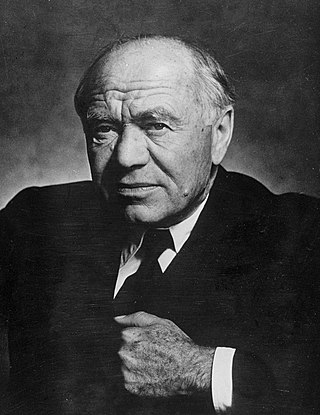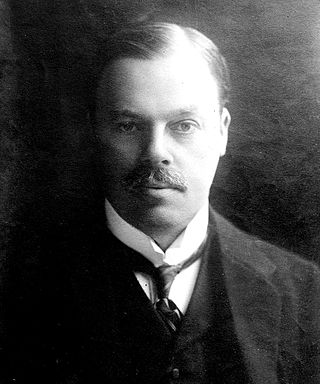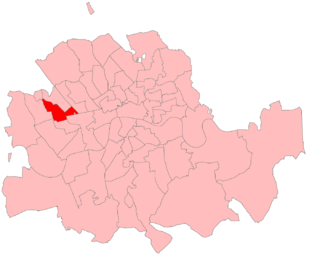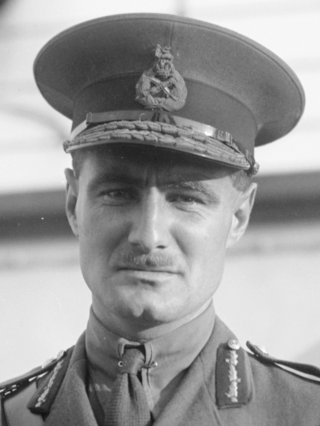Related Research Articles

James Ramsay MacDonald was a British politician who served as Prime Minister of the United Kingdom, the first who belonged to the Labour Party, leading minority Labour governments for nine months in 1924 and again between 1929 and 1931. From 1931 to 1935, he headed a National Government dominated by the Conservative Party and supported by only a few Labour members. MacDonald was expelled from the Labour Party as a result.

Stanley Baldwin, 1st Earl Baldwin of Bewdley, was a British Conservative Party politician who dominated the government of the United Kingdom between the world wars, serving as prime minister on three occasions, from May 1923 to January 1924, from November 1924 to June 1929, and from June 1935 to May 1937.

William Maxwell Aitken, 1st Baron Beaverbrook, generally known as Lord Beaverbrook, was a Canadian-British newspaper publisher and backstage politician who was an influential figure in British media and politics of the first half of the 20th century. His base of power was the largest circulation newspaper in the world, the Daily Express, which appealed to the conservative working class with intensely patriotic news and editorials. During the Second World War, he played a major role in mobilising industrial resources as Winston Churchill's Minister of Aircraft Production.

Douglas McGarel Hogg, 1st Viscount Hailsham was a British lawyer and Conservative politician who twice served as Lord Chancellor, in addition to a number of other Cabinet positions. Mooted as a possible successor to Stanley Baldwin as party leader for a time in the very early 1930s, he was widely considered to be one of the leading Conservative politicians of his generation.

The 1931 United Kingdom general election was held on Tuesday 27 October 1931 and saw a landslide election victory for the National Government which had been formed two months previously after the collapse of the second Labour government. Collectively, the parties forming the National Government won 67% of the votes and 554 seats out of 615. The bulk of the National Government's support came from the Conservative Party, and the Conservatives won 470 seats. The Labour Party suffered its greatest defeat, losing four out of every five seats compared with the previous election, including the seat of its leader Arthur Henderson. Ivor Bulmer-Thomas said the results "were the most astonishing in the history of the British party system". It is the most recent election in which one party received an absolute majority of the votes cast, and the last UK general election not to take place on a Thursday. It would be the last election until 1997 in which a party won over 400 seats in the House of Commons.
The National Labour Organisation, also known as the National Labour Committee or simply as National Labour, was a British political group formed after the 1931 creation of the National Government to co-ordinate the efforts of the supporters of the government who had come from the Labour Party. The party leaders were Ramsay MacDonald (1931–1937) and his son Malcolm MacDonald (1937–1945).

Leopold Charles Maurice Stennett Amery,, also known as L. S. Amery, was a British Conservative Party politician and journalist. During his career, he was known for his interest in military preparedness, British India and the British Empire and for his opposition to appeasement. After his retirement and death, he was perhaps best known for the remarks he made in the House of Commons on 7 May 1940 during the Norway Debate.

In the politics of the United Kingdom, a National Government is a coalition of some or all of the major political parties. In a historical sense, it refers primarily to the governments of Ramsay MacDonald, Stanley Baldwin and Neville Chamberlain which held office from 1931 until 1940.

Harold Sidney Harmsworth, 1st Viscount Rothermere, was a leading British newspaper proprietor who owned Associated Newspapers Ltd. He is best known, like his brother Alfred Harmsworth, later Viscount Northcliffe, for the development of the Daily Mail and the Daily Mirror. Rothermere was a pioneer of popular tabloid journalism.
Imperial Preference was a system of mutual tariff reduction enacted throughout the British Empire following the Ottawa Conference of 1932. As Commonwealth Preference, the proposal was later revived in regard to the members of the Commonwealth of Nations. Joseph Chamberlain, the powerful colonial secretary from 1895 until 1903, argued vigorously that Britain could compete with its growing industrial rivals and thus maintain Great Power status. The best way to do so would be to enhance internal trade inside the worldwide British Empire, with emphasis on the more developed areas — Australia, Canada, New Zealand, and South Africa — that had attracted large numbers of British settlers.

Paddington South was a Parliamentary constituency in London which returned one Member of Parliament. It was a compact urban area, but predominantly wealthy, and was most famously represented by Lord Randolph Churchill during the latter part of his career.
The National Government of August–October 1931, also known as the First National Government, was the first of a series of national governments formed during the Great Depression in the United Kingdom. It was formed by Ramsay MacDonald as Prime Minister of the United Kingdom following the collapse of the previous minority government, led by the Labour Party, known as the Second MacDonald ministry.

The 1931 Islington East by-election was a parliamentary by-election held on 19 February 1931 for the House of Commons constituency of Islington East in Islington, North London.

Air Commodore Alfred Cecil Critchley, was a military commander, entrepreneur and politician in the United Kingdom. He served as a Conservative Member of Parliament (MP) from 1934 to 1935.

The Westminster St. George's by-election, 1931 was a parliamentary by-election held on 19 March 1931 for the British House of Commons constituency of Westminster St. George's.

This article documents the career of Winston Churchill in Parliament from its beginning in 1900 to the start of his term as Prime Minister of the United Kingdom in World War II.
The 1930 Bromley by-election was a parliamentary by-election held on 2 September 1930 for the British House of Commons constituency of Bromley in north-west Kent.
The National Government of 1931–1935 was formed by Ramsay MacDonald following his reappointment as Prime Minister of the United Kingdom by King George V after the general election in October 1931.

The 1930 Paddington South by-election was held on 30 October 1930. The by-election was held due to the death of the incumbent Conservative MP, Commodore Douglas King. It was won by the Empire Free Trade Crusade candidate Ernest Taylor.

In the United Kingdom, the interwar period (1918–1939) was a period of relative stability after the division of Ireland, though of economic stagnation. In politics, the Liberal Party collapsed and the Labour Party became the main challenger to the dominant Conservative Party throughout the period. The Great Depression affected Britain less severely economically and politically than other major nations, although some areas still suffered from severe long-term unemployment and hardship, especially mining districts and in Scotland and North West England.
References
- ↑ Anne Chisholm and Michael Davie (1992). Beaverbrook: A Life. London, Hutchinson.
- ↑ Ackerley, Aaron (1 January 2022). "The Young Crusaders". History Today . 72 (1).
- Peter Barberis, John McHugh and Mike Tyldesley, Encyclopedia of British and Irish Political Organizations